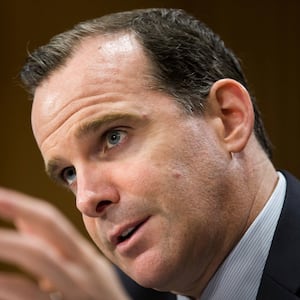Patrick Shanahan, a former Boeing executive and the current Defense Department second in command, will take over the Pentagon next week, replacing Gen. James Mattis who resigned in the fallout over an abrupt decision to withdraw troops from Syria in the fight against ISIS.
Mattis was originally expected to remain in his position until February to ensure a smooth transition will now hand over the reigns on Jan. 1, after the president reportedly decided to remove him early. The decorated general and Trump have been disagreed about pulling some 2,000 U.S. troops from Syria and declaring victory in the war against ISIS without consulting allies.
The president announced Shanahan's promotion in a tweet on Sunday, noting Shanahan “has a long list of accomplishments” while serving as Deputy Defense Secretary and at Boeing, adding his new head of the Pentagon will be “great.”
Shanahan, who served as Mattis’s deputy, assumed his role as deputy in July 2017. Prior to that, he worked as a Boeing executive, according to the Department of Defense, where he ran some of the company's most controversial weapons programs.
While at Boeing, Shanahan ran its missile defense business, helping to create an airborne antimissile laser, according to The New York Times. The project was scrapped by the Pentagon, however. He also worked on a ground-based missile defense system, the efficacy of which is questionable, per The Times.
The airborne laser—a 747 retrofitted with an energy weapon—in particular was a boondoggle and was cancelled by Robert Gates during his term as Secretary of Defense.
News of Shanahan's promotion came as the president held a new call Sunday with Turkish President Tayyip Erdogan to discuss a “a slow and highly coordinated” withdrawal of American troops from Syria. It was a previous phone call between the U.S. and Turkish presidents that reportedly spurred Trump to hastily order a U.S. pullout from Syria.
Mattis’s early departure appears to be yet another example of fallout from Trump’s erratic foreign policy decisions. His announcement was followed by that of Brett McGurk, the American diplomat who has brought together and led the 79-nation coalition fighting ISIS.
The musical chairs began Wednesday when Trump tweeted “We have defeated ISIS in Syria, my only reason for being there during the Trump Presidency” and in another tweet that evening, said “After historic victories against ISIS, it’s time to bring our great young people home!”
White House Press Secretary Sarah Huckabee Sanders told reporters shortly thereafter that Trump was indeed removing U.S. forces from the war-torn region.
“We have started returning United States troops home as we transition to the next phase of this campaign,” Sanders said in a statement, per CNBC. “Five years ago, ISIS was a very powerful and dangerous force in the Middle East, and now the United States has defeated the territorial caliphats...These victories over ISIS in Syria do not signal the end of the Global Coalition or its campaign.”
Sanders did say that the U.S. will “continue to work together to deny radical Islamist terrorists territory, funding, support, and any means of infiltrating our borders” alongside its allies.
Trump’s snap decision, however, was reportedly made despite the views of his national security advisers, and was forged without discussion with regional allies.
The fate of U.S. allies in the region, such as Kurdish forces fighting ISIS in Syria, is now unclear.
Mattis met with Trump on Thursday in an effort to convince the President to reconsider the troop withdrawal. Trump declined, prompting Mattis to tender his resignation, The New York Times reported.
“The most decorated Marine and thought leader on the military basically just said, ‘Fuck this,’” a source familiar with Mattis previously told The Daily Beast.
Mattis reportedly asked his staff to distribute 50 copies of his resignation letter around the Pentagon.
Mattis’s missive, which didn’t contain any words of praise for POTUS, intimated that Trump’s foreign policy was dangerous and wrongheaded. It went public shortly after Trump tweeted about Mattis’s departure.
“My views on treating allies with respect and also being clear-eyed about malign actors and strategic competitors are closely held and informed by over four decades of immersion in these issues,” Mattis said in his letter, elaborating that “I believe we must be resolute and unambiguous in our approach to those countries whose strategic interests are increasingly in tension with ours,” such as China and Russia.
“Because you have the right to have a Secretary of Defense whose views are better aligned with yours on these and other subjects,” Mattis also wrote, “I believe it is right for me to step down from my position.”
McGurk, who has served as an Iraq expert to three presidents beginning with George W. Bush was expected to leave in February, but announced his decision to leave sooner on Friday. Trump downplayed the departure, writing in a tweet, “Brett McGurk, who I do not know, was appointed by President Obama in 2015. Was supposed to leave in February but he just resigned prior to leaving. Grandstander? The Fake News is making such a big deal about this nothing event!” Trump tweeted.
Former Obama national security adviser Susan Rice slammed Trump on Saturday for his Tweet on McGurk.
“The fact that you say you don’t know @brett_mcgurk speaks volumes about your commitment to fighting ISIS @realDonaldTrump. Why don’t you know the man who has done more than any civilian to degrade ISIS? I can assure you @BarackObama knows him well,” Rice tweeted in response.









